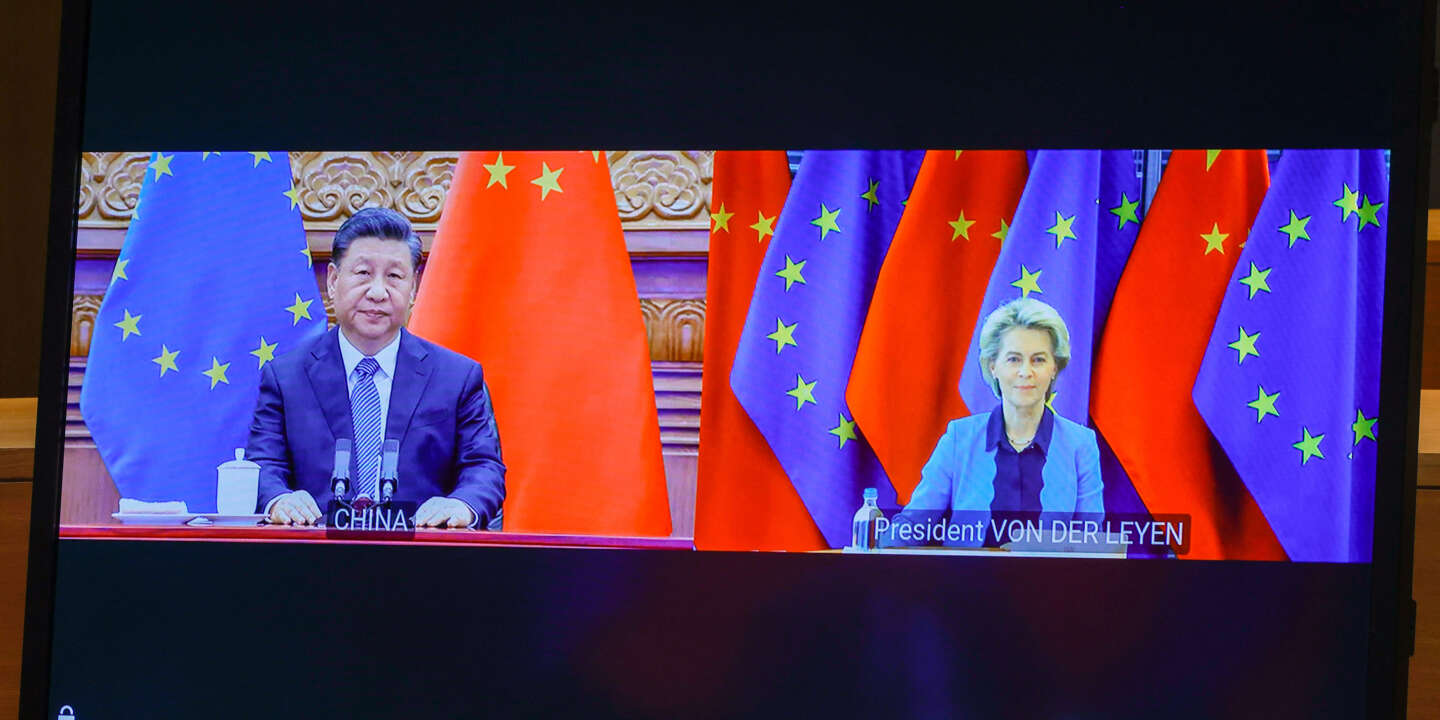

Chinese Prime Minister Le Keqiang in video conference with European Commission President Ursula von der Leyen, April 1, 2022 in Brussels (POOL / Olivier Matthys)
The EU warned Beijing on Friday that any aid to Moscow to evade Western sanctions will damage its economic relations with Europe, its largest trading partner, and calls on it to put pressure on Russia to end the conflict in Ukraine.
“We have made it clear that China should not interfere with the sanctions (against Moscow) if it does not support them,” European Commission President Ursula von der Leyen said after a videoconference interview with Chinese President Xi Jinping.
While Beijing refuses to condemn the invasion of Ukraine and defends its “rock-solid” friendship with Moscow, the EU wants to prevent China from actively supporting Russia, either by increasing its purchases of hydrocarbons or by providing financial aid.
Such support “would seriously tarnish China’s reputation in Europe”, where companies “look at how countries position themselves”, Ms von der Leyen noted, believing Beijing’s stance will influence “long-term investment decisions”.
“We hope that China will take into account the importance of its international image and its economic relationship with the EU,” added Charles Michel, President of the European Council, who took part in the virtual summit.
Europeans and Chinese are interdependent: the EU absorbs 15% of the Asian giant’s exports, supplying it with manufactured goods and crucial components. China represents 10% of the exports of the Twenty-Seven, an important market for European industrialists, especially German ones.
“A prolongation of the conflict, with disruptions to the global economy, is in no one’s interest, especially not in China,” hammered Ursula von der Leyen, who said Beijing should “take its responsibility to get Russia to negotiate peace”.
The Europeans are “trying to influence the strategic calculation of the Chinese leaders by pointing out the economic costs they would incur,” notes Grzegorz Stec of the German institute Merics.
-“Stabilization factors”-
Chinese Prime Minister Li Keqiang, who also spoke to European leaders on Friday, reiterated that Beijing “opposes both hot and cold wars, blocks divisions and refuses to take sides,” said Wang Lutong, a senior Chinese diplomat.
Xi Jinping called on the EU to “form its own perception of China and conduct its own policy towards” Beijing autonomously, according to a Chinese state press release.
Before the communist regime, Europeans got caught up in a conflict instigated by Washington that exposed the vulnerabilities of the West.
Ultra-dependent on Russian gas, “Europe may have shot itself in the foot by joining US sanctions,” the nationalist daily Global Times warned Thursday.
China and the EU, “as great powers, great markets and great civilizations (…) have to bring stabilizing factors to a turbulent world,” Xi Jinping added, according to the Chinese report, which only casually mentions “Ukraine’s crisis”.
-“Illusion”-
“The idea of decoupling China from Russia is an illusion: when the war in Ukraine is over, the United States’ attention will focus primarily, and not in a friendly spirit, on China, which therefore has an interest in to maintain cooperation “with his neighbor, tempers Sylvie Bermann, former French ambassador to Moscow and Beijing.

European Council President Charles Michel (l), European Diplomacy Head Josep Borrell (d) and European Commission President Ursula von der Leyen in a videoconference with Chinese Prime Minister Li Keqiang on April 1, 2022 in Brussels (POOL / Olivier Matthys)
And to think that many countries (India, Pakistan, South Africa, Brazil, etc.) also refuse to criticize Moscow.
On Wednesday, during a visit to Beijing, the head of Russian diplomacy, Sergei Lavrov, had received a reaffirmation of the two countries’ “borderless” friendship against the United States, in the name of a new “multipolar world order”: a vision that concerns about the rise of an “authoritarian” bloc against the West.
In this context, “the danger is that China + sells its neutrality (on Ukraine) too much + to obtain concessions, such as the resumption of negotiations on the investment agreement”, signed by Brussels and Beijing at the end of 2020 on the initiative of Berlin, warns Valérie Niquet of the Strategic Research Foundation.
The ratification of this agreement has been frozen today by EU sanctions to sanction the use of forced labor in China’s Xinjiang region and Beijing’s counter-sanctions against MEPs and researchers. Added to this is the conflict over China’s blocking of imports from Lithuania following the opening of a Taiwanese representation in this country.



